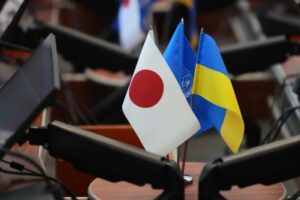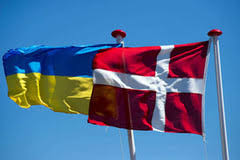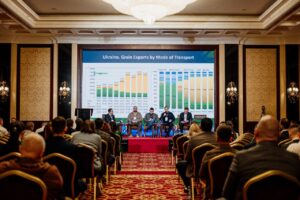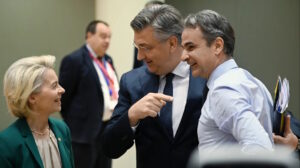
NovaPay, a financial company of the Nova group of companies, has installed 2.8 thousand of its own POS terminals in 1.9 thousand Nova Poshta offices across Ukraine, except for the temporarily occupied territories, the company said in a statement on Tuesday.
“Our goal is to provide all Nova Poshta branches with NovaPay POS terminals,” the release quotes NovaPay Chief Innovation Officer Oleksiy Ruban as saying.
According to him, the installation of its own POS terminals increases the speed and security of service, and also allows you to quickly resolve problematic issues in case of equipment failures and not to seek help from partner banks.
At the beginning of this year, Nova Poshta’s network in Ukraine consisted of 11.46 thousand branches and 15.59 thousand post offices in more than 10 thousand settlements throughout Ukraine.
As reported, NovaPay plans to install 10 thousand POS terminals in Ukraine by 2025.
NovaPay is an international financial service founded in 2001, part of the Nova group, which provides online and offline financial services at Nova Poshta offices. According to its website, the company employs about 13 thousand people in more than 3.6 thousand Nova Poshta offices across Ukraine. According to the National Bank of Ukraine, the company accounts for 35% of the total volume of domestic money transfers.
The total number of transactions through NovaPay in 2023 reached 354 million, which is 31% more than in the previous year, and their amount increased by 41% to UAH 235.5 billion.

Japan intends to increase its presence in the Ukrainian investment market, in particular, to expand business ties in the field of investment and trade, Japanese partners will open an office of the Japan External Trade Organization JETRO in Kyiv, the Ministry of Economy of Ukraine reported following a meeting on April 23 between Deputy Minister and Trade Representative Taras Kachka and the Economic Mission of the Government of Japan.
“The governments of Ukraine and Japan are already preparing a draft updated Agreement on the Promotion and Protection of Investments, which will promote economic development and expand trade between the two countries. The agreement will, in particular, provide Japanese investors with reliable legal protection and guarantees for their investments, which is an important incentive for investment in the private sector and projects to restore Ukraine,” Kachka was quoted as saying in the release.
It is stated that Japan plans to provide EUR 160 million to support Ukraine’s economic recovery projects. Ukraine’s priorities include energy, housing, critical infrastructure, humanitarian demining, and business support.
The participants also discussed the participation of representatives of the Japanese government and Japanese business in the Ukraine Recovery Conference (URC 2024) in Berlin on June 11-12 this year, as well as preparations for EXPO 2025 in Osaka and the Ministerial Meeting of the Organization for Economic Cooperation and Development (OECD).

The Danish government has decided to allocate additional EUR380m for the reconstruction of Ukraine’s infrastructure and construction of wind farms, Danish Business Minister Morten Bedskou said at a meeting with Ukrainian President Volodymyr Zelensky in Kiev.
According to the press service of the President, during the meeting, the Danish Minister of Entrepreneurship noted the opportunities for strengthening cooperation between the countries and informed about the decision of his government to allocate additional funding for the Ukrainian mechanism of the Danish Export and Investment Fund.
As noted, this mechanism fully covers the risks of Danish exporters and investors, as well as provides financing to Ukrainian private companies and state institutions.
For him, the Danish government will allocate almost EUR380 million more for the restoration of critical infrastructure and construction of wind farms.
At the meeting, Zelensky and Bedskou paid special attention to the prospects of expanding Danish business and attracting new investments in Ukraine.
In turn, the President of Ukraine emphasized the importance of the fact that the Minister of Entrepreneurship of Denmark during his visit to Kiev is accompanied by the heads of Danish companies – the largest investors in the economy of Ukraine.
“Your activity in the Ukrainian market is striking. With your investments you set an example for other partners and investors”, – emphasized Zelensky.
As reported, during the recent visit of the First Lady of Ukraine Olena Zelenska to Denmark, she asked Danish partners for additional funding for the Danish Export and Investment Fund, the funds from which come to help Ukraine.
DENMARK, INFRASTRUCTURE, Morten Bedskow, RECONSTRUCTION, UKRAINE

The upper house of the U.S. Congress (Senate) has passed a bill to provide aid to Ukraine. There were 79 votes in favor.
The law is to be signed by US President Joe Biden in the near future.
As reported, the bill approved on April 22 by the lower house of the US Congress (House of Representatives) provides for the allocation of almost $61 billion for purposes related to the support of Ukraine.
In addition to assistance to Ukraine, the package also includes $26 billion in aid to Israel, $8 billion to support US allies in the Indo-Pacific, as well as provisions for new sanctions against Russia, China, and Iran and the US President’s authority to use frozen Russian assets for the benefit of Ukraine.
April 23 President Zelenskyy has a phone conversation with US President Joseph Biden, during which Biden assures him that if the bill is approved by the Senate, he will immediately sign it into law.
The White House website confirms Biden’s words that his administration will quickly provide significant new security assistance packages for Ukraine in combat and air defense as soon as the Senate passes the supplemental national security package and he signs it into law.
For his part, Ukrainian President Volodymyr Zelenskyy made it clear that Ukraine would receive long-range ATACMS missiles as part of the US aid package. “And today’s result is that all the dots have been dotted in the ATACMS agreement for Ukraine. Thank you, Mr. President! Thank you, Congress! Thank you, America!” he said in a video message on Monday.
The provision of missiles with a range of up to 300 kilometers has been a request of Kyiv for the past year, but the US administration has constantly postponed the issue. The missiles are provided for in a congressional resolution passed on Saturday, but it contains a reference to the administration’s ability to refuse to deliver them if it is in the national security interest.

On April 18, 2024, “BLACK SEA GRAIN. KYIV” – took place one of the largest grain forums in Ukraine, which provides exclusive analytics of the agricultural market from world experts, discusses global macroeconomic and regional trends, long-term forecasts, effective communication and contacts with international industry leaders.
The event brought together hundreds of leading international producers and processors of grains and oilseeds, traders, agricultural holdings, banks and investment funds, trading exchanges, government representatives and industry associations, logistics, brokerage, insurance, surveying, legal and other companies.
The opening remarks were delivered by Sergiy Feofilov, CEO of UkrAgroConsult, which is celebrating its 30th anniversary this year.
Immediately after the greetings, the “HARD TALK” started on the topic: Future EU agricultural policy (Green Deal, Deforestation Law). Impact on the production of grains and oilseeds in the EU and Ukraine and margins/profitability of farmers.
The panel was moderated by Leonid Kozachenko, President of the Ukrainian Agrarian Confederation.
The President of the UAC outlined the situation on the grain market in the extremely difficult conditions of the war and emphasized such important issues as transport and logistics, problems of financial support for agricultural market participants, European integration processes and challenges.
Leonid Kozachenko also emphasized the importance of river navigation, in particular, the importance of rebuilding the Kakhovka dam and building more modern locks than those that existed before.
Oleh Khomenko, CEO of the Ukrainian Agribusiness Club, focused on trade barriers and disputes and negotiations with Poland and the EU.
The UCAB CEO noted: “Yesterday, in an interview, the Polish president said that there is an American farmer in Ukraine, that our land owners are Americans. How absurd is it that such issues are discussed at the level of presidents? And yet everyone realizes that this is not the case. If we are talking about large agricultural companies, if we analyze our market structure in the State Statistics Committee, we have only 10% of land in large agricultural companies.”
He added that there are important events to come in the EU, such as the European Parliamentary elections and the appointment of a new European Commission. In addition to this, the EU Council presidency will be assumed by Hungary in July and Poland in January.
Volodymyr Pugachev, Executive and Regional Director for Eastern Europe of the Danube Soybean Association, spoke about the innovations in the EU for soybean producers.
“The supply of soybeans or its products to the European Union from January 1, 2025 (pay attention here, as it already affects this year’s harvest, which will be) will require a traceability certificate along with the geo-coordinates of the field and confirmation of the absence of deforestation… That is, it is necessary to somehow confirm that after 2020 there was no deforestation on the field where the soybeans imported to the EU were grown.
In practice, this means a change in the whole classical approach to the supply of agricultural products, as they cease to be a “bulk commodity” and require full traceability, what is called “hard identity preservation.”
“The main problem is that the European bureaucracy has not been able to introduce clear implementation rules so far,” said Pugachev about the EU EUDR regulation.
Mykola Gorbachev, President of the Ukrainian Grain Association, spoke about logistical problems and solutions and predicted the price situation on the grain market: “We predict that we will harvest somewhere around 76-77 million tons of grains and oilseeds next year. This is a bit less, of course, than before. Our forecast is based on the fact that weather factors will not be as favorable as last season. We forecast exports of grains and oilseeds at around 43 million tons. This season, we forecast about 53 million tons, which means we will have a 10 million ton decrease – 6 million tons less corn and 4 million tons less wheat exports. Soybeans will increase slightly, and other crops will increase slightly. Due to this decrease, I think that the norms set by Europe for us will be enough for us to trade corn with Europe within the limits without additional costs.
Our forecast is that the price will increase slightly. At the end of the season, we will see that the price will go up a bit in Ukraine. By the end of May, Ukraine will be able to export almost all of its stocks, and in June we will have almost nothing. The global price will go up a bit. In Europe, the yields will be lower. That’s why prices will be a bit better for our farmers.”

The prime ministers of Croatia and Greece may run for the presidency of the European Commission, German newspaper Bild reports, citing EU sources. “As an EU insider told BILD, two possible alternatives have already been proposed. Greek Prime Minister Kyriakos Mitsotakis (56, a powerful and influential member of the European People’s Party) and Croatian Prime Minister Andrej Plenkovic (54, won the internal elections this week) have expressed interest,” the Bild article says.
In March of this year, the European People’s Party voted to support European Commission President Ursula von der Leyen as a candidate for the post of European Commission President.
The President of the European Commission is appointed by the European Parliament, the elections to which will be held on June 6-9 this year.